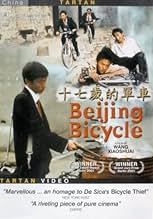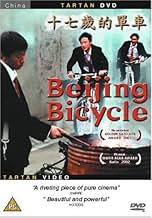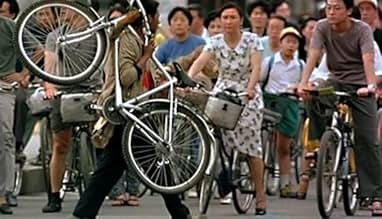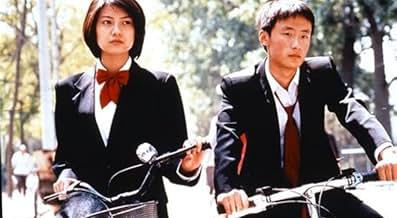IMDb-BEWERTUNG
7,2/10
4842
IHRE BEWERTUNG
Füge eine Handlung in deiner Sprache hinzuA seventeen-year-old country boy working in Beijing as a courier has his bicycle stolen, and finds it with a schoolboy his age.A seventeen-year-old country boy working in Beijing as a courier has his bicycle stolen, and finds it with a schoolboy his age.A seventeen-year-old country boy working in Beijing as a courier has his bicycle stolen, and finds it with a schoolboy his age.
- Auszeichnungen
- 2 Gewinne & 10 Nominierungen insgesamt
Lin Cui
- Guo Liangui
- (as Cui Lin)
Guancheng Liu
- Mantis
- (as Lei Liu)
Empfohlene Bewertungen
"Beijing Bicycle" (Chinese, 2002): This is one of the purest films I've seen all year. Don't believe the blurb written about it: two boys learn sharing through the use of one bicycle. The blurb couldn't be MORE WRONG. This story has one of the smoothest, most linear, singularly focused goals I've experienced in a film along with "The Field", which I rewatched earlier this year. There are no plot twists, no what-ifs, no "oh my god, I had no idea THAT was happening!" moments. "Beijing Bicycle" is a simple, yet symbolic film about a young man who comes to the big city, gets a job as a bicycle messenger, and things quickly go from uncomfortable, to bad, to awful, to worse it seems. "Guei" (the messenger) wasn't raised to recognize the ways of a metropolis, which tries to chew him up piece by piece. We get to "know" other characters who we believe (along with Guei) ARE who they appear to be. "Beijing Bicycle" has to be the finest expression of what I would expect to be the current set of fears by those in China who see their future as an unknown, with the "replacement model" being the U.S.A.. This story expresses the huge doubts caused by the loss of Mao and the Communist way of life. Even if it WASN'T perfect, they were familiar with it, and many of these "new world" things did not happen THEN. Those who are (literally) "buying" into the free market concepts, are losing their pride, identities, and souls. Watch for the slow, steady transitions of situations and characters. Watch for the symbols of decadence, greed, unhealthy living, improper greed, corruption, and sadness all within a small group of teens.
A bit irritating at times and certainly not a regular fare even for those used to Asian movies. The story revolves around ideas of going up the social ladder... about how material goods can change your status, and what can happen due to greed.
The main character a peasant from the countryside finds himself in the "wild" urban enviroment and all its impersonal aggresiveness. The big city is unforgiving. The way the main characters tend to react to otherwise incredibly hard situations with silence sure is different from western standards.
Overall a beautiful movie with some very good scenes... still slow at times and could have been better 7 in 10.
The main character a peasant from the countryside finds himself in the "wild" urban enviroment and all its impersonal aggresiveness. The big city is unforgiving. The way the main characters tend to react to otherwise incredibly hard situations with silence sure is different from western standards.
Overall a beautiful movie with some very good scenes... still slow at times and could have been better 7 in 10.
When you read a synopsis of Beijing Bicycle, it may remind you of Vittorio de Sica's 1948 masterpiece The Bicycle Thieves. A poor man, having recently come to the city from the country, wins a job at a bicycle courier business, and, on a delivery, gets his bike stolen. He then proceeds to search the city of Beijing to retrieve it. Luckily, it quickly veers away from being a simple update of that classic story. He finds the alleged thief, a high school kid, and steals it back. For the first hour or more, the bike moves back and forth between them. The two characters are compared and contrasted, and it works as an effective class study.
The direction and editing are particularly great in the film. The climax involves two intersecting chases, and it is one of the best stages sequences I've ever seen. There are a couple of problems, small ones for me, but perhaps big ones for critics and audiences. The high school kid is extraordinarily unlikable. A person behind me declared loudly, "What a brat!" And he is. I personally don't mind if a character is unsympathetic (although we are asked to sympathize with him, I believe). My own biggest problem is that the ending is slightly unsatisfactory. There's not much closure. Still, Beijing Bicycle is an excellent film. 9/10.
The direction and editing are particularly great in the film. The climax involves two intersecting chases, and it is one of the best stages sequences I've ever seen. There are a couple of problems, small ones for me, but perhaps big ones for critics and audiences. The high school kid is extraordinarily unlikable. A person behind me declared loudly, "What a brat!" And he is. I personally don't mind if a character is unsympathetic (although we are asked to sympathize with him, I believe). My own biggest problem is that the ending is slightly unsatisfactory. There's not much closure. Still, Beijing Bicycle is an excellent film. 9/10.
I really enjoyed watching this film for a second time recently. A story of a young peasant from the outskirts of town (Beijing) struggle against societal oppositions, finding work, keeping bike from preying thieves, and learning survival skills. Beijing is not an easy town to tame!
At times very funny! At times very violent, makes you want to turn your head in disgust. The violence is to prove a point. No good comes from it, whatsoever!
I think this film is well made. The pace is smooth. The acting is superb. I especially like the acting of the employer who hires the main character as a messenger boy. He is what you would call a prudent business man with heart!
Please take some time out of your day and watch this tense movie with moralistic themes: rich versus poor, right versus wrong, bullying versus stubbornness. A winner in my book!
At times very funny! At times very violent, makes you want to turn your head in disgust. The violence is to prove a point. No good comes from it, whatsoever!
I think this film is well made. The pace is smooth. The acting is superb. I especially like the acting of the employer who hires the main character as a messenger boy. He is what you would call a prudent business man with heart!
Please take some time out of your day and watch this tense movie with moralistic themes: rich versus poor, right versus wrong, bullying versus stubbornness. A winner in my book!
Beijing Bicycle by Sixth Generation director Wang Xiaoshuai is an unsettling look at modern China in transition that depicts the relationship between two young men of different social status, both yearning for acceptance and stubbornly determined to succeed. Guei (Cui Lin) is an unexpressive working class 17-year old who has come to Beijing to find work, while Jian (Li Bin), is a sophisticated middle-class student, desperate to belong, seeking approval from his biker friends and his beautiful girlfriend Gin (Zhao Yiwel). The film explores the consequences when Guei's bicycle is stolen and ends up in Jian's hands. The bicycle represents an escape for both from the competitive pressures of their lives. For Guei, it is a means of access to a job, an income, and survival. For Jian, it is the pathway to being "cool" and being in the in-group, much like what the flashy sports car represents to young men in Western countries.
As the film opens, a group of boys are being interviewed for a job as a courier. Enticed by the prospect of owning a silver mountain bike, Guei takes the job and begins to save money to buy the bike, given to him as a loan (the bike is his once he has earned 700 yuan, which is about $85). Out of his element in the bewildering city, Guei runs into an awkward situation almost immediately when he makes a delivery in a luxury hotel and is directed to the gym where he is forced to strip for a shower before he can deliver his package. He is then asked to pay for the shower when he leaves but does not have enough money. When his bike is stolen just one day before he can become the owner, Guei's job is threatened.
Xie Jian as Guei's manager is both abrasive and compassionate and offers to take Guei back to work if he can find his bike. In a city where bicycles are still the most common means of transportation, against all odds he sets out to find it. The film is about the bicycle but is also about the city of Beijing. Guei's search for the bicycle takes him into all corners of the city. With an original score by Felix Wang and magnificent cinematography by Jie Liu, the city comes alive with streets littered with traffic juxtaposed with mysterious alleys where old men play board games or do Tai Chi. Wang adds the little touches as well such as two friends sharing a toothbrush and a single spigot of water in an alley serving an entire neighborhood.
Like De Sica's The Bicycle Thief, the stolen bicycle is central to the story, but here it is not about the hunt but about the consequences that follow from its recovery. When the student Jian is found with the bike, both he and Guei assert ownership and the bike is stolen and reclaimed by both boys several times, each time ending in a scuffle with Jian's friends. In a powerful confrontation with his father, Jian, in a rage against his father for reneging on his promise to buy him a bike, finally admits to stealing his father's money to purchase the bike himself at the flea market after it was fenced. The two boys are pitted against each other but mutual need brings them together and allows them to work out a compromise by alternating the days when each can use the bike. Eventually a serious confrontation takes place that escalates into a startling conclusion.
Beijing Bicycle is a deeply human odyssey that, while somewhat repetitive, never loses its rhythm. Though there is little dialogue and the characters communicate mostly with body language, long silences, and facial expressions, the actors perform their roles with astonishing authenticity. Parts of the film are emotionally upsetting, but there is also a sweet innocence at play. Jian acts like a typical adolescent-surly, angry with his parents, shy with girls, audacious and impetuous one minute, and then needy and contrite the next. In one of the concluding scenes, as a group of punks chase two boys through a an older section of Beijing; one says to the other, "What are you doing? This doesn't concern you." The other replies, "I don't know my way out." In today's new China, caught between the traditions of an ancient culture and the new urban reality, young people are having trouble finding their way out.
As the film opens, a group of boys are being interviewed for a job as a courier. Enticed by the prospect of owning a silver mountain bike, Guei takes the job and begins to save money to buy the bike, given to him as a loan (the bike is his once he has earned 700 yuan, which is about $85). Out of his element in the bewildering city, Guei runs into an awkward situation almost immediately when he makes a delivery in a luxury hotel and is directed to the gym where he is forced to strip for a shower before he can deliver his package. He is then asked to pay for the shower when he leaves but does not have enough money. When his bike is stolen just one day before he can become the owner, Guei's job is threatened.
Xie Jian as Guei's manager is both abrasive and compassionate and offers to take Guei back to work if he can find his bike. In a city where bicycles are still the most common means of transportation, against all odds he sets out to find it. The film is about the bicycle but is also about the city of Beijing. Guei's search for the bicycle takes him into all corners of the city. With an original score by Felix Wang and magnificent cinematography by Jie Liu, the city comes alive with streets littered with traffic juxtaposed with mysterious alleys where old men play board games or do Tai Chi. Wang adds the little touches as well such as two friends sharing a toothbrush and a single spigot of water in an alley serving an entire neighborhood.
Like De Sica's The Bicycle Thief, the stolen bicycle is central to the story, but here it is not about the hunt but about the consequences that follow from its recovery. When the student Jian is found with the bike, both he and Guei assert ownership and the bike is stolen and reclaimed by both boys several times, each time ending in a scuffle with Jian's friends. In a powerful confrontation with his father, Jian, in a rage against his father for reneging on his promise to buy him a bike, finally admits to stealing his father's money to purchase the bike himself at the flea market after it was fenced. The two boys are pitted against each other but mutual need brings them together and allows them to work out a compromise by alternating the days when each can use the bike. Eventually a serious confrontation takes place that escalates into a startling conclusion.
Beijing Bicycle is a deeply human odyssey that, while somewhat repetitive, never loses its rhythm. Though there is little dialogue and the characters communicate mostly with body language, long silences, and facial expressions, the actors perform their roles with astonishing authenticity. Parts of the film are emotionally upsetting, but there is also a sweet innocence at play. Jian acts like a typical adolescent-surly, angry with his parents, shy with girls, audacious and impetuous one minute, and then needy and contrite the next. In one of the concluding scenes, as a group of punks chase two boys through a an older section of Beijing; one says to the other, "What are you doing? This doesn't concern you." The other replies, "I don't know my way out." In today's new China, caught between the traditions of an ancient culture and the new urban reality, young people are having trouble finding their way out.
Wusstest du schon
- WissenswertesThe arcade game that Jian and his friends play is "Dance Dance Revolution".
Top-Auswahl
Melde dich zum Bewerten an und greife auf die Watchlist für personalisierte Empfehlungen zu.
- How long is Beijing Bicycle?Powered by Alexa
Details
- Erscheinungsdatum
- Herkunftsländer
- Offizielle Standorte
- Sprache
- Auch bekannt als
- Fahrraddiebe in Peking
- Drehorte
- Produktionsfirmen
- Weitere beteiligte Unternehmen bei IMDbPro anzeigen
Box Office
- Bruttoertrag in den USA und Kanada
- 66.131 $
- Weltweiter Bruttoertrag
- 215.854 $
- Laufzeit1 Stunde 53 Minuten
- Sound-Mix
- Seitenverhältnis
- 1.85 : 1
Zu dieser Seite beitragen
Bearbeitung vorschlagen oder fehlenden Inhalt hinzufügen

Oberste Lücke
By what name was Beijing Bicycle - Fahrradiebe (2001) officially released in India in English?
Antwort























